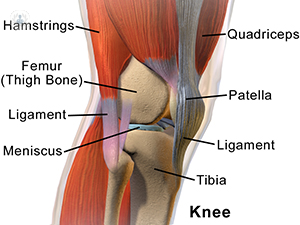Hoffa’s syndrome – could this be the cause of pain in your knee?
Written by:Hoffa’s syndrome, otherwise known as infrapatellar fat pad impingement, is a problem which causes pain at the front of the knee (anterior knee pain). It is due to inflammation in the fat pad of the knee or Hoffa’s fat pad. It is a very common cause of anterior knee pain, but one that is very often misdiagnosed, or not diagnosed at all. Very commonly, people get told by their doctor that they have 'anterior knee pain', which just means pain at the front of the knee - but the patient knows that! The true problem, which would be diagnosed by a specialist, is often Hoffa’s syndrome. Leading consultant orthopaedic surgeon, Mr Charles Willis-Owen explains all about the condition.

What causes Hoffa’s syndrome?
At the front of the knee, just below the kneecap and  behind the kneecap tendon (patellar tendon) there is a very sensitive piece of fat called the Hoffa’s fat pad. If this becomes pinched, squashed, or damaged it becomes swollen, inflamed and sore. Once it becomes swollen, it becomes bigger in size and is more likely to get pinched or squashed again. A vicious cycle can then quickly develop, leading to a lot of pain at the front of the knee that is hard to get rid of.
behind the kneecap tendon (patellar tendon) there is a very sensitive piece of fat called the Hoffa’s fat pad. If this becomes pinched, squashed, or damaged it becomes swollen, inflamed and sore. Once it becomes swollen, it becomes bigger in size and is more likely to get pinched or squashed again. A vicious cycle can then quickly develop, leading to a lot of pain at the front of the knee that is hard to get rid of.
This is more likely to happen in people whose knees go beyond straight (hyperextend) and who are hypermobile. This is more com mon in younger women, and in dancers and gymnasts. It is also seen after surgery in some cases and quite a lot in patients who frequently ski and/or run (both of which can cause pressure at the front of the knee).
mon in younger women, and in dancers and gymnasts. It is also seen after surgery in some cases and quite a lot in patients who frequently ski and/or run (both of which can cause pressure at the front of the knee).
What are the symptoms of Hoffa’s syndrome?
The symptoms of Hoffa’s syndrome include pain at the front and the sides of the knee, which can be hard to pinpoint. Often there has been no clear injury and it has come on over a period of days or weeks. Climbing stairs is painful, as well as sitting with the knee bent. There is usually a background ache with occasional jolts of sharp pain. Sometimes the knee can give way.
How long does Hoffa’s syndrome last without treatment?
Without treatment, Hoffa’s syndrome won’t usually go away on its own. If it has been present for six weeks or more, you will need some help. Some people give up their hobbies and past-times and it settles within a few months of rest, however it comes back when they return to their sports. If left untreated and allowed to get worse, patients can even end up on crutches because the pain is so bad.
Learn more about Hoffa's syndrome here!
How is Hoffa’s syndrome treated?
Treatment of Hoffa’s syndrome firstly focuses on calming down the inflammation, and secondly stopping the pinching and squashing to break the cycle. People who visit Mr Willis-Owen for treatment are usually in quite a severe state, so they are typically given a small anti-inflammatory injection into the fat pad, which helps to calm the inflammation right away and physically shrink the Hoffa’s fat pad. This is followed by some very specific physiotherapy and the use of K-tape to lift the fat pad out of the front of the knee and stop the pinching.
The injection is a very easy one using a tiny needle and most people report much less discomfort than a when having a blood test.
Usually these simple things result in a complete cure, but sometimes if the condition is severe, up to three injections are needed. Rarely if nothing else has fixed the problem Mr Willis-Owen can perform very gentle minor surgery to trim out some of the inflamed fat pad. This is a 10 minute operation done as a day case procedure.
Mr Willis-Owen sees around 250 cases of Hoffa’s syndrome per year, with people coming from all over the world, ranging from sports stars and royalty to regular people with sore knees where no-one else has managed to help.
It is a very common feature that people have seen doctors elsewhere who have not managed to make the diagnosis and have even gone so far as to say there is nothing wrong, or that the pain is imagined! This is really unfortunate, and often puts people off getting a second or third opinion.
If you would like to make an appointment with Mr Willis-Owen, you can do so here.


